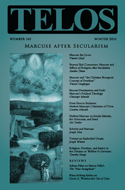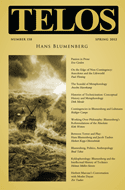By Zvi Tauber · Thursday, January 30, 2014 Zvi Tauber’s “Herbert Marcuse on Jewish Identity, the Holocaust, and Israel” appears in Telos 165 (Winter 2013). Read the full version online at the Telos Online website, or purchase a print copy of the issue in our store.
 The article focuses at three themes of Herbert Marcuse’s approach, views, and attitudes concerning Judaism, Jewish history and the State of Israel. Marcuse, whose research and philosophy only marginally addressed the “Jewish question,” never denied his Jewish origins, but at the same time he never used this objective fact as an exclusive or decisive argument to affect his views on various issues, not even regarding world-historical matters of particular relevance to the Jews. Even if generally, positively, Marcuse endeavored to constitute the Marxian Realm of Freedom, or at least strove to fathom scientifically why in the course of modern history, an authentic revolution for the liberation of man has failed repeatedly, his major, immediate, intellectual and socio-political concern was the struggle against the reemergence of an oppressive reign of horror, including a struggle against the possible recurrence of a genocide. The article focuses at three themes of Herbert Marcuse’s approach, views, and attitudes concerning Judaism, Jewish history and the State of Israel. Marcuse, whose research and philosophy only marginally addressed the “Jewish question,” never denied his Jewish origins, but at the same time he never used this objective fact as an exclusive or decisive argument to affect his views on various issues, not even regarding world-historical matters of particular relevance to the Jews. Even if generally, positively, Marcuse endeavored to constitute the Marxian Realm of Freedom, or at least strove to fathom scientifically why in the course of modern history, an authentic revolution for the liberation of man has failed repeatedly, his major, immediate, intellectual and socio-political concern was the struggle against the reemergence of an oppressive reign of horror, including a struggle against the possible recurrence of a genocide.
Continue reading →
By Zvi Tauber · Thursday, April 19, 2012 Zvi Tauber’s “Herbert Marcuse on the Arab-Israeli Conflict: His Conversation with Moshe Dayan” appears in Telos 158 (Spring 2012). Read the full version of the article as well as the protocol of the conversation between Marcuse and Dayan at the TELOS Online website. You can also purchase a print copy of the issue here.
 Herbert Marcuse visited Israel in late December 1971. Recently I found in The Israel Defense Forces and Defense Establishment Archives (IDFA) an unpublished document concerning his visit to Israel: the protocol of his meeting (December 29, 1971) with Moshe Dayan, the then Israel’s Defense Minister and the topmost Israeli politician at the time. The document was unknown to researchers of Marcuse’s writings and political activity till now, as if the content of the meeting were defined a confidential material. In my short commentary article, I seek to understand why this meeting was never publicized by Dayan or Marcuse. I also reconstruct Dayan’s and Marcuse’s ideas and statements, that came up in their conversation, while comparing them to the well-known political views and positions of each of them. Lastly, I dedicate special discussion and analysis to three relevant themes that were mentioned in that meeting: (1) on possible negotiations between Israel and Egypt in the period between the Six Day War (June 1967) and the Yom Kippur War (October 1973); (2) on Dayan’s explicit admission, that the State of Israel was, in fact, established on Arab land, and on Marcuse’s supporting the idea of the Palestinian State, i.e., the solution of “two states for two peoples”; and (3) on historical prognoses of the politician and the philosopher—Marcuse’s fear of the outbreak of war between Egypt and Israel and his quasi-prediction of Sadat’s assassination. Herbert Marcuse visited Israel in late December 1971. Recently I found in The Israel Defense Forces and Defense Establishment Archives (IDFA) an unpublished document concerning his visit to Israel: the protocol of his meeting (December 29, 1971) with Moshe Dayan, the then Israel’s Defense Minister and the topmost Israeli politician at the time. The document was unknown to researchers of Marcuse’s writings and political activity till now, as if the content of the meeting were defined a confidential material. In my short commentary article, I seek to understand why this meeting was never publicized by Dayan or Marcuse. I also reconstruct Dayan’s and Marcuse’s ideas and statements, that came up in their conversation, while comparing them to the well-known political views and positions of each of them. Lastly, I dedicate special discussion and analysis to three relevant themes that were mentioned in that meeting: (1) on possible negotiations between Israel and Egypt in the period between the Six Day War (June 1967) and the Yom Kippur War (October 1973); (2) on Dayan’s explicit admission, that the State of Israel was, in fact, established on Arab land, and on Marcuse’s supporting the idea of the Palestinian State, i.e., the solution of “two states for two peoples”; and (3) on historical prognoses of the politician and the philosopher—Marcuse’s fear of the outbreak of war between Egypt and Israel and his quasi-prediction of Sadat’s assassination.
Continue reading →
|
|
 The article focuses at three themes of Herbert Marcuse’s approach, views, and attitudes concerning Judaism, Jewish history and the State of Israel. Marcuse, whose research and philosophy only marginally addressed the “Jewish question,” never denied his Jewish origins, but at the same time he never used this objective fact as an exclusive or decisive argument to affect his views on various issues, not even regarding world-historical matters of particular relevance to the Jews. Even if generally, positively, Marcuse endeavored to constitute the Marxian Realm of Freedom, or at least strove to fathom scientifically why in the course of modern history, an authentic revolution for the liberation of man has failed repeatedly, his major, immediate, intellectual and socio-political concern was the struggle against the reemergence of an oppressive reign of horror, including a struggle against the possible recurrence of a genocide.
The article focuses at three themes of Herbert Marcuse’s approach, views, and attitudes concerning Judaism, Jewish history and the State of Israel. Marcuse, whose research and philosophy only marginally addressed the “Jewish question,” never denied his Jewish origins, but at the same time he never used this objective fact as an exclusive or decisive argument to affect his views on various issues, not even regarding world-historical matters of particular relevance to the Jews. Even if generally, positively, Marcuse endeavored to constitute the Marxian Realm of Freedom, or at least strove to fathom scientifically why in the course of modern history, an authentic revolution for the liberation of man has failed repeatedly, his major, immediate, intellectual and socio-political concern was the struggle against the reemergence of an oppressive reign of horror, including a struggle against the possible recurrence of a genocide.  Herbert Marcuse visited Israel in late December 1971. Recently I found in The Israel Defense Forces and Defense Establishment Archives (IDFA) an unpublished document concerning his visit to Israel: the protocol of his meeting (December 29, 1971) with Moshe Dayan, the then Israel’s Defense Minister and the topmost Israeli politician at the time. The document was unknown to researchers of Marcuse’s writings and political activity till now, as if the content of the meeting were defined a confidential material. In my short commentary article, I seek to understand why this meeting was never publicized by Dayan or Marcuse. I also reconstruct Dayan’s and Marcuse’s ideas and statements, that came up in their conversation, while comparing them to the well-known political views and positions of each of them. Lastly, I dedicate special discussion and analysis to three relevant themes that were mentioned in that meeting: (1) on possible negotiations between Israel and Egypt in the period between the Six Day War (June 1967) and the Yom Kippur War (October 1973); (2) on Dayan’s explicit admission, that the State of Israel was, in fact, established on Arab land, and on Marcuse’s supporting the idea of the Palestinian State, i.e., the solution of “two states for two peoples”; and (3) on historical prognoses of the politician and the philosopher—Marcuse’s fear of the outbreak of war between Egypt and Israel and his quasi-prediction of Sadat’s assassination.
Herbert Marcuse visited Israel in late December 1971. Recently I found in The Israel Defense Forces and Defense Establishment Archives (IDFA) an unpublished document concerning his visit to Israel: the protocol of his meeting (December 29, 1971) with Moshe Dayan, the then Israel’s Defense Minister and the topmost Israeli politician at the time. The document was unknown to researchers of Marcuse’s writings and political activity till now, as if the content of the meeting were defined a confidential material. In my short commentary article, I seek to understand why this meeting was never publicized by Dayan or Marcuse. I also reconstruct Dayan’s and Marcuse’s ideas and statements, that came up in their conversation, while comparing them to the well-known political views and positions of each of them. Lastly, I dedicate special discussion and analysis to three relevant themes that were mentioned in that meeting: (1) on possible negotiations between Israel and Egypt in the period between the Six Day War (June 1967) and the Yom Kippur War (October 1973); (2) on Dayan’s explicit admission, that the State of Israel was, in fact, established on Arab land, and on Marcuse’s supporting the idea of the Palestinian State, i.e., the solution of “two states for two peoples”; and (3) on historical prognoses of the politician and the philosopher—Marcuse’s fear of the outbreak of war between Egypt and Israel and his quasi-prediction of Sadat’s assassination. 






